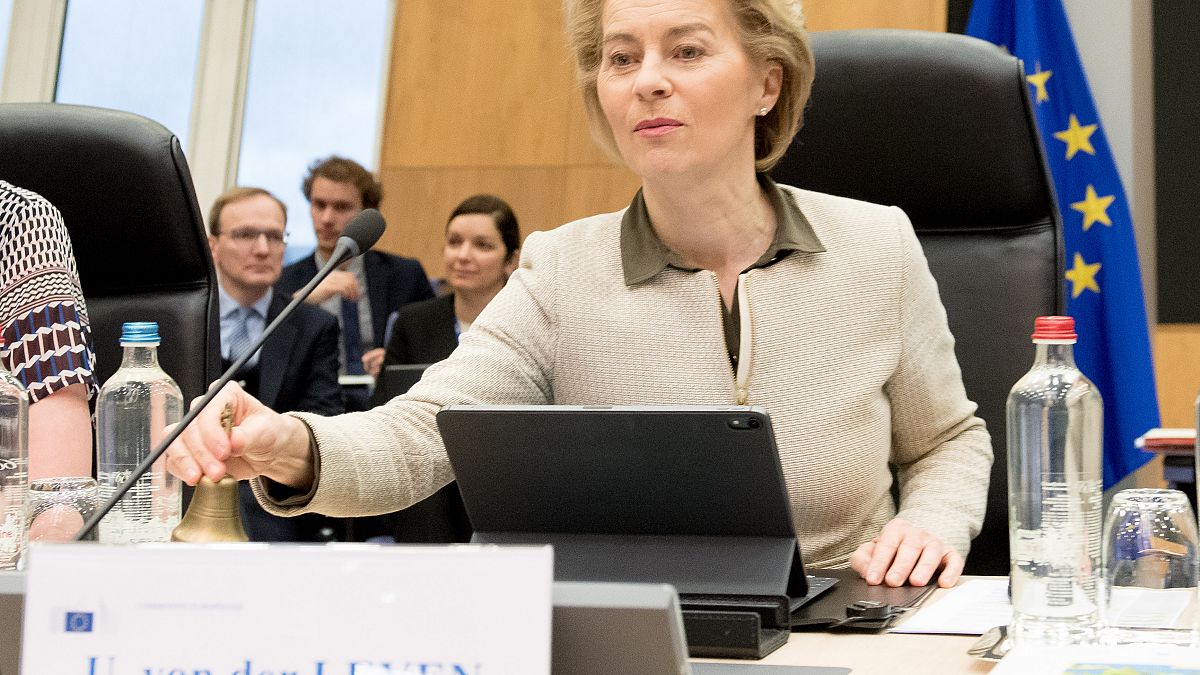Monday marks 100 days of Ursual von der Leyen's team in office, and while they set clear goals in terms of climate, digital and gender, events regarding migration, COVID-19 and foreign policy have overtaken the European Commission.
Monday marks 100 days in office for Team Ursula von der Leyen, and the new Commission has certainly had its hands full: launching key priorities such as the Green deal, digital and gender equality, while also dealing with coronavirus and border tensions between Greece and Turkey over migration.
Marking the anniversary at the European Commission, von der Leyen said:
"Today it's no longer the question if there will be a European Green Deal or whether the European Union will become climate-neutral. But the question is how - how are we proceeding and how far-reaching will the transition be?"
We take a look at the Green Deal at 100 days - and its chances of survival.
Green Deal
Pressure from climate strikers has been key in boasting green goals at EU level, boasted by a good turnout for Greens in different parts of the bloc.
However, the co-president of the Greens in the European Parliament, Philippe Lamberts told Euronews reporter that he'd hoped for a more ambitious strategy: "I would expect the Commission to be more daring and to challenge the member states more. The good news is that in the Parliament, there is a majority for a Green Deal. Raising our ambition for 2030, currently it's minus 40 percent CO2 emission. There is a majority in Parliament to bring that to minus 55 percent."
So it might just mean a key policy could come to pass, the trickier question comes from how it might be financed.
Erdogan in Brussels
The Turkish president announced over the weekend that he would travel to the Belgian capital. While in town, he is heading to NATO and the EU Council. Tensions are simmering over Erdogan reneging on the 2016 EU-Turkey statement to stem the flow of migrants to Europe.
Back in 2016, the EU pledged €6 billion euros to help improve the humanitarian situation for Syrians in Turkey. It also promised that for every Syrian migrant sent back, one Syrian already there will be resettled in the EU.
The deal has largely worked, for Brussels at least. The number of migrants making often perilous journeys decreased dramatically.
But President Erdogan has repeatedly threatened to renege on that deal, claiming the EU simply hasn’t provided the money promised.
Ten days ago, he did just that, when the Turkish government encouraged thousands of migrants to head to the border with Greece, many are still there, refused entry by forceful Greek authorities.
Now in Brussels, Erdogan argues: 'help me more or I will unleash a fresh migration crisis on your borders'.
For some EU leaders, the demand for more money and greater visa rights amounts to blackmail. But they also know that another 2015 crisis, which brought the EU to the brink, must be avoided at all costs.
Ultimately they may have little choice but to give Mr Erdogan what he wants.
Coronavirus invades plenary
MEPs usually meet to debate and vote on key measures once a month in Strasbourg, but the decision was taken late last week to keep the session in Brussels.
However, late on Monday a new call was made to slim down the agenda: that means no debates, no votes.


